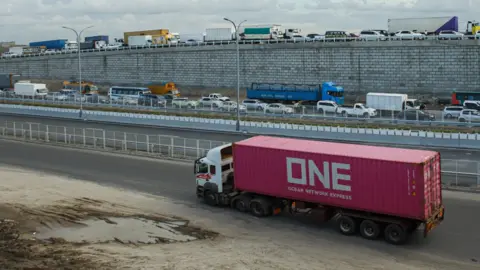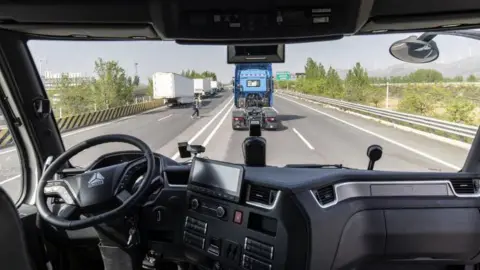The Digital Revolution in Trucking: Balancing Efficiency and Earnings
Business and finance reporter covering corporate news, markets, and economic trends

The trucking industry has experienced a seismic shift with the advent of digital technology. While these advancements promise efficiency and real-time connectivity, they also pose challenges to traditional earnings and job security for drivers.

Jared, a Canadian truck driver with over two decades of experience, recalls the early days of his career when technology played a minimal role in logistics. Today, the landscape has transformed significantly. Jared now relies on multiple digital devices to secure work, a stark contrast to the past when truckers depended on payphones and pagers. This evolution has been driven by digital platforms likened to Uber, which match truckers with freight companies in need of their services. While this has streamlined operations and enhanced access to jobs, it has also led to a decrease in pay rates per mile, a concern echoed by many in the industry.

The emergence of digital platforms in Canada, such as Uber Freight, has brought efficiency to a fragmented market largely composed of small trucking firms. These platforms offer flexibility and transparency, allowing carriers to select jobs based on their preferences. However, labor unions express apprehension about the 'Uberisation' of trucking, fearing it could exacerbate wage stagnation and undermine larger, unionized carriers. Despite these concerns, companies like Freightera are leveraging AI to enhance booking processes and improve operational efficiencies.
Globally, digital trucking services have revolutionized logistics. In Kenya, where road freight dominates, platforms like LORI optimize truck usage, reducing empty returns and fuel consumption. This not only lowers operational costs but also contributes to reducing carbon emissions. The potential of digital logistics to enhance energy efficiency and sustainability is significant, as highlighted by industry leaders who advocate for the widespread adoption of such technologies.
While digital platforms are transforming logistics, another technological frontier looms: autonomous trucking. The trial of driverless trucks in the United States and China signifies a potential future where AI could replace human drivers. This prospect raises questions about safety, regulatory frameworks, and employment impacts. Despite the technological readiness, the transition to driverless operations faces significant hurdles, including public trust and legal obstacles.
The future of trucking is poised on the brink of further technological integration, promising greater efficiency and lower emissions. However, the path forward must balance technological advancement with fair labor practices and job security. As the industry navigates these changes, stakeholders must collaborate to ensure that technology serves to enhance rather than dismantle the livelihoods of those within the sector.
About David Chen
Business and finance reporter covering corporate news, markets, and economic trends